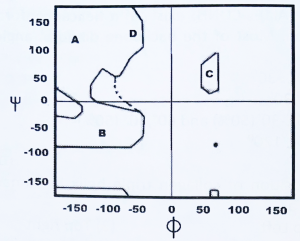9. The regions of phi, psi space occupied by well characterized protein secondary structures are marked on a Ramachandran plot as shown above. Which of the following statements is CORRECT?

(1) A- right handed α helix, B- ß strand, C- left handed α helix, D- collagen,
(2) A- ß strand, B- right handed α helix, C- left handed α helix, D- collagen,
(3) A- collagen, B- right handed α helix, C- left handed α helix, D- ß strand,
(4) A- left handed α helix, B- ß strand, C-collagen, D- right handed α helix
Understanding Secondary Structure Regions in the Ramachandran Plot
The Ramachandran plot is a graphical representation of the allowed dihedral angles (φ and Ψ) of amino acids in a protein. It provides insights into different secondary structures such as α-helices, β-strands, and collagen conformations.
Correct Answer:
The correct answer is:
(1) A- right-handed α-helix, B- β-strand, C- left-handed α-helix, D- collagen.
Explanation of Ramachandran Plot Regions
The Ramachandran plot divides the φ and Ψ angle space into specific regions where different secondary structures occur:
1. Right-Handed α-Helix (A)
- Located in the bottom-left quadrant of the plot.
- Typical φ ≈ -60° and Ψ ≈ -45°.
- Most common helix found in proteins.
2. β-Strand (B)
- Located in the upper-left quadrant.
- Typical φ ≈ -120° and Ψ ≈ 120°.
- Forms the extended structure of β-sheets.
3. Left-Handed α-Helix (C)
- Found in the upper-right quadrant.
- Typical φ ≈ 60° and Ψ ≈ 30°.
- Less common but observed in certain polypeptides.
4. Collagen (D)
- Located near φ ≈ -60° and Ψ ≈ 135°.
- Forms a triple-helical structure unique to collagen.
Biological Significance of Secondary Structure Regions
1. Role in Protein Folding
- The placement of residues in these regions determines the overall protein structure and function.
- Incorrect angles can lead to misfolding diseases.
2. Structural Validation in Protein Models
- If a residue falls outside these allowed regions, it may indicate errors in a protein structure model.
3. Design of Engineered Proteins
- Understanding secondary structure preferences helps in designing synthetic proteins and peptides.
Conclusion
The Ramachandran plot clearly maps different secondary structures based on φ and Ψ angles. The correct identification of right-handed α-helices, β-strands, left-handed α-helices, and collagen conformations is essential for understanding protein folding and stability.




25 Comments
Suman bhakar
March 27, 2025Okay sir 👍
Aakansha sharma Sharma
September 25, 2025(2) A- ß strand, B- right handed α helix, C- left handed α helix, D- collagen,
Kirti Agarwal
September 26, 2025Opt B
Dharmpal Swami
September 26, 2025Option B correct
Neha Yadav
September 26, 2025A – ß strand, B- right handed α helix, C- left handed α helix, D- collagen,
Samiksha bajiya
September 26, 2025Option b is correct
Soniya Shekhawat
September 26, 2025Option b is correct.
Minal Sethi
September 26, 2025A- ß strand, B- right handed α helix, C- left handed α helix, D- collagen,
option B
Devika
September 26, 2025Option B is correct
Muskan Yadav
September 26, 2025A- right-handed α-helix, B- β-strand, C- left-handed α-helix, D- collagen.
Pallavi Ghangas
September 26, 2025b
Priya khandal
September 27, 2025Option b is right A Bstrand B right handed alpha helix C left handed alpha helix D collagen
Khushi Singh
September 27, 2025B is correct
HIMANI FAUJDAR
September 27, 2025Ans Option B is correct, A=- ß strand, B- right handed α helix, C- left handed α helix, D- collagen.
Bhawna Choudhary
September 27, 2025Option B is correct
Kajal
September 28, 2025Option b is correct
Mohd juber Ali
September 28, 20251. A-beta strand left upper in L.aa ➡️ right lower (D.aa)
2. B- alpha helix (left lower)➡️ right upper(D.aa)
3. C (upper right handede in L.aa) ➡️ lower left
4 D left upper (collagen)
Manisha choudhary
September 28, 2025Option b is correct
Mansukh Kapoor
September 28, 2025The correct answer is option 2nd
roopal sharma
September 28, 2025second option is correct
Anurag Giri
September 28, 2025A- right-handed α-helix, B- β-strand, C- left-handed α-helix, D- collagen
Arushi Saini
September 28, 2025A- ß strand, B- right handed α helix, C- left handed α helix, D- collagen,
Heena Mahlawat
September 28, 2025Option 2
Avni
September 29, 2025(2) A- beta strand, B- right handed alpha helix, C- left handed alpha helix, D- collagen
Neeraj Sharma
October 5, 2025A-beta strand, B-right handed alpha helix, C-left handed alpha helix, D-collagen